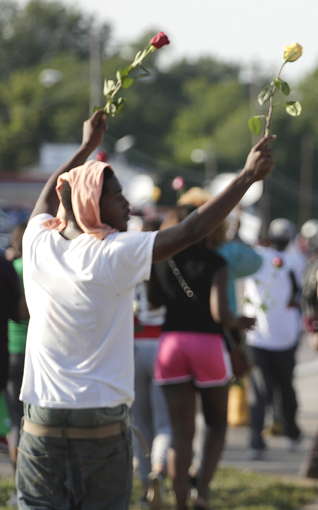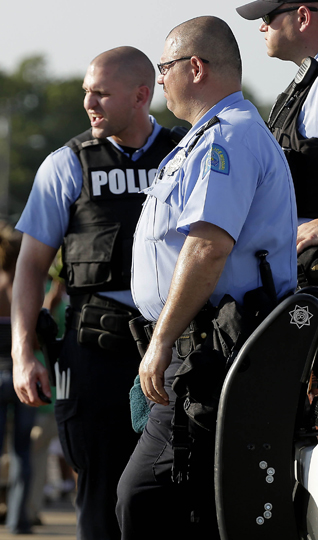Columnists
How We See:
A Tale Of Conflicting Visions In Ferguson, Missouri
- Letters From Espanola
EK ONG KAAR KAUR
The last few months I have worked with a wonderful wholistic eye doctor who lives in the mountains north of Santa Fe, New Mexico, USA.
Dr. Sam Berne. He has an integrated approach to eyes. An approach that links the eyes with cognitive awareness.
"70% of our vision is connected to our brain," he says.
He uses different physical and cognitive techniques to help people with their vision problems. The health of the eyes and the capacity to "see" go hand in hand with the brain's ability to integrate information wholistically, across both hemispheres.
One of the most important lessons that I have learned during this process is that physical sight and cognitive vision are interrelated, and ultimately unique for every person. Because the brain interprets what the eyes see, we can only perceive what we have experienced. If an experience is missing, the mind cannot interpret information coming through the eyes in a certain way.
So rather than being objective, sight is profoundly subjective. I can only see what I know, what I have learned, and what I have lived through. The eyes and the brain have this singular relationship.
Sight has meaning in the context of vision. And vision is the way the mind puts together the sensory input of the eyes to make a picture and a story.
Over the last three months, as we have worked together, not only has my sight improved, but my sense of identity has shifted with it. This has surprised me. Part of my vision problems resulted from my suppressing feelings that I did not want to see. It created a palpable stress in the eyes. By releasing that stress through the various eye exercises, my sight has gotten better.
But those feelings have also become much more present in my awareness, changing the way I see myself, my life and my environments.
It has been a wonderful and profound journey, and I am grateful for it. But it has also given me a different perspective while watching events unfold in Ferguson, Missouri.
The news in the United States the last several weeks has documented the painful drama that unfolded in Ferguson. An unarmed black teenager, Michael Brown, was shot and killed by a white police officer, Darren Wilson. This event sparked racial protests and violence, especially when a grand jury failed to indict Officer Wilson on murder charges.
Many people have asked: why the protests? Why the violence?
In a lot of ways, it comes from the fact that nobody knew what happened. So everybody "saw" what was in their experience to see.
The black community in Ferguson "saw" a continued pattern of racial oppression. Where young black men are automatically suspect, even when they are innocent. Of white police officers habitually committing violence against their community. Where these police officers are not held accountable and justice never happens.
This is not sight in the physical sense. This is vision. The way the brain puts together information, and integrates it into a picture and a story. That vision created the outbursts, the protests and the violence in Ferguson.
On the other side, you have a police establishment governed by its own sense of rules and responsibility. Where officers can fire a weapon in self-defense if they feel threatened. Where police put their lives on the line every day against thieves and murderers and drug dealers.
And because the police are sworn to protect the community, the legal system protects them. Holds them to different standards, frankly, when it comes to people dying by their hand.
This, too, is not sight in the physical sense. This is also vision. The police have their own unique set of experiences.
People see what they have learned or what they know. No one sees beyond that.
In this sense, Ferguson illustrates how vision in different communities is so very different because the experience and the learning are so very different. No one knows for sure what happened between Michael Brown and Officer Wilson.
Who was right and who was wrong?
It does not really matter.
A young boy is dead and a police officer will be haunted by this tragic event the rest of his life. In many ways, how we see creates our reality. Not the other way around.
I think what happened in Ferguson is also happening in the Middle-East right now. It happened in Punjab in the 80's. It happens anywhere the vision of one community so deeply contradicts the vision of another community.
The problem is we have no mechanism to reconcile these deeply different visions. Instead, suppression becomes the answer. Just as my eyes created a physical pattern to block me from seeing feelings that made me uncomfortable; collectively, as communities, we suppress our sight from perceiving the experiences of others that may make us question our own values.
Silencing one another is the extreme tactic people pursue. And that is very rarely a fair fight. Almost always, one side has more gun power than the other, or more legal legitimacy than the other. Even if they do not have the moral or spiritual high ground.
If I fight you, then I do not have to listen to what you are saying. Because listening may change my experience, alter my brain and give me a different vision than what I have now. It takes courage to see something that may make you feel uncomfortable. It takes courage because discomfort is a sign that something needs to change.
That is the irony of sight. No one wants to feel something negative. And yet, those things that are difficult to see often hold the most promise of transformation and healing.
In these moments of intense conflict, the real question is this: Do we stay in our comfort zone and suppress each other's stories, so that we can stay safe in a familiar vision?
Or do we decide to step outside that comfort zone, stop the suppression and let something new come in? Something that will give us a new experience, a new learning, a new insight.
When the brain changes, the vision will change, and maybe, just maybe, we can build a new understanding that leads to different actions and different outcomes.
Hundreds of year ago, political change created social change. Eliminating the death grip ‘royalty’ had on lives and resources opened up political power to people of all persuasions.
That changed the world.
But today, politicians cannot really lead us into all the social changes that are necessary. It is people of consciousness who have to step up and create the dialogue where first discomfort and ultimately transformation can happen.
Politicians cannot do it.
But citizens can.
This is the level of work we need to do so that, one day, the Michael Browns and Officer Wilsons of the world will have a chance to make a different choice and write a different story.
December 4, 2014
Conversation about this article
1: Baldev Singh (Bradford, United Kingdom), December 04, 2014, 10:34 AM.
The problems in America -- as everywhere where humans live! -- with this sectarian and colour divide hinge on education that teaches that we must see the whole human race as one ... and not blacks, whites, browns, yellows, reds and pinks! We should see everyone as we want ourselves to be seen.
2: Ajit Singh Batra (Pennsville, New Jersey, USA..), December 04, 2014, 10:58 AM.
The brain or vision of the people is generally based on the political, social and the economic structures of society. However, the truth is that the whole humanity is one family. Every person must be respected not in terms of his/her birth which connects them to race, creed and caste, but as a Person. Yhe Sikh Gurus said all persons though appearing different under different influences, are the same. They wanted to solve all social, economic and political problems amongst human beings through equality. Therefore, socially no distinctions which cause resentment should ever be made between person and person. But then, people learn to misuse our freedoms and rights -- such as, for example, the liberty of expression -- and people acquire the knack to escape from or bypass the clutches of the law.
3: Parmjit Singh (Canada), December 05, 2014, 1:17 AM.
Amazing leadership and leadership imparted in this article. Wow! This should be required reading to shape young minds.
4: D J Singh (USA), December 05, 2014, 6:36 PM.
Excellent article. But what about the victim's family? Any insights regarding altering their vision or perception? Then only will the message in this article be complete!
5: Harmeet Singh (USA), December 07, 2014, 12:51 AM.
Cognitive vision can simply impair our physical sight.
6: Ek Ong Kaar Kaur (Espanola, New Mexico, USA), December 07, 2014, 5:30 PM.
DJ Singh - thanks for your comments and your question. In terms of the victim's family: this is a really deep issue - not just for this family but any family involved in this type of situation, where a beloved son or daughter, sister or brother, mother or father, has been killed. So my answer is two fold, in terms of vision. The first part is that grief has to happen. The grieving process absolutely must take place. Grief is our body's and mind's God-given mechanism to process loss. And when we do not allow ourselves to grieve, we can never integrate the loss. When we do not grieve, it has the opposite effect where we can never move on with our lives. Unresolved grief hangs out in the subconscious and can actually become the seed of future sickness or imbalances. So grieving is necessary and support for the family needs to be there without any judgement or agenda. The Guru tells us, and in fact almost all the major religions talk about, surrender to the Will of the Divine. For Christians, this takes the form of forgiveness. For Buddhists - compassion is their road. For the Sikh - "Thy Will is sweet," is our devotion and obedience. And so every sacred path has a way to help people transcend the pain of loss. But in my own experience, what is important is that surrender to the Divine Will is the ultimate resolution of the grieving process. It cannot replace the grieving process. When we use Divine Will as a way to stop ourselves or others from grieving, it creates lasting damage. But when we allow the grief to unfold through faith, it can eventually resolve our grief by harmonizing ourselves with Divine Will, which then takes us beyond ourselves and helps the cycle of pain to stop. There is a wonderful talk by Dr. Fred Luskin from Stanford University about this. He has taught about forgiveness for over 20 years, and recognizes the need for grieving to happen before forgiveness can take place. So that to me is the view for the families. Grieve first. Then find your way to how your own spiritual path talks about forgiveness or compassion or surrender to the Divine. Here is the link to the article. Hope it's helpful. http://greatergood.berkeley.edu/article/item/what_is_forgiveness




